Thyroid tests: which ones to do and why are they so important? Symptoms, preparation, norms
The thyroid doesn't hurt and the symptoms of disease can be easily ignored. Take care of prevention and get your thyroid tested.


Learn more about our editorial process
.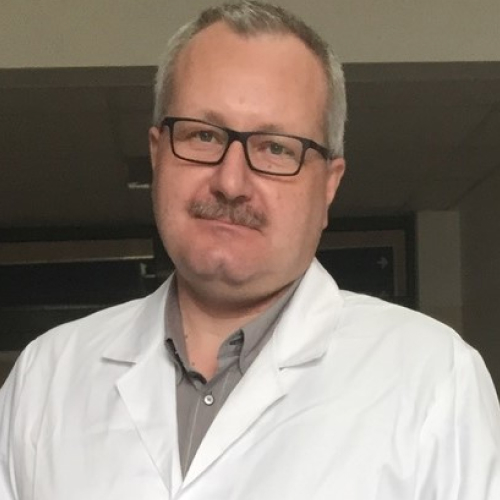

Learn more about our editorial process
.

Learn more about our editorial process
.
Why you can trust us
Articles on Natu.Care are written based on scientific research, data from government websites and other reliable sources. The texts are written in cooperation with doctors, nutritionists and other health and beauty experts. Articles are reviewed before publication and during significant updates.
.Learn more about our editorial process
.Information about advertisements
Content on Natu.Care may contain links to products from the sale of which we may receive a commission. When creating content, we adhere to high editorial standards and take care to be objective about the products discussed. The presence of affiliate links is not dictated by our partners, and we select the products we review ourselves completely independently.
.Learn more about our terms and Conditions
.Thyroid problems are experienced by more than 22% of Poles of all ages, and most do not know it. Symptoms are easily trivialised and explained away by other ailments.
Fatigue and lethargy are blamed on overwork. After all, weight fluctuations and hair loss are down to poor diet and stress. You'll buy a cream for dry skin and wrap yourself in a blanket or wear thicker gloves when you're cold. But this only "treats" the symptoms. The most important thing is to find out the cause. Thyroid tests and consultation with your doctor will be key here.
From this article you will learn:
- What symptoms thyroid disease can give .
- What thyroid tests will help diagnose health problems .
- How often you should get your thyroid tested .
- How to prepare for thyroid testing .
- Whether you can do preventive tests at home .
If you notice the symptoms described in this article in yourself, have your thyroid examined and consult an endocrinologist. Early recognition of abnormalities will allow for effective treatment.

Sprawdź, za co pokochały go tysiące klientek Natu.Care Premium Omega-3ᵀᴳ -15% z kodem BLOG15
Natu.Care Omega-3ᵀᴳ Premium
Natu.Care Omega-3ᵀᴳ Premium dla zdrowia serca, mózgu i odporności. Najlepsza przyswajalność. Optymalna dawka 750 mg. Przebadana przez niezależne laboratorium.
Zobacz więcej
Produkt ma super skład, transparentną etykietę i co dla mnie jest ważne – małe kapsułki do połknięcia. Nie ma też nieprzyjemnego efektu odbijania rybą, który miałam spożywając inne produkty. Widzę znaczną poprawę odporności. Polecam!@Kasia P.
See also what other examinations are worth doing:
Indications for a thyroid test
.
The thyroid gland is a small butterfly-shaped organ. It is located at the anterior base of the neck, just below the laryngeal cartilage. Despite its inconspicuous size, it is one of the most important glands in the entire body, as it regulates many processes, including metabolic metabolism, growth and development of the body, cardiovascular function, and the maintenance of mental-emotional balance.
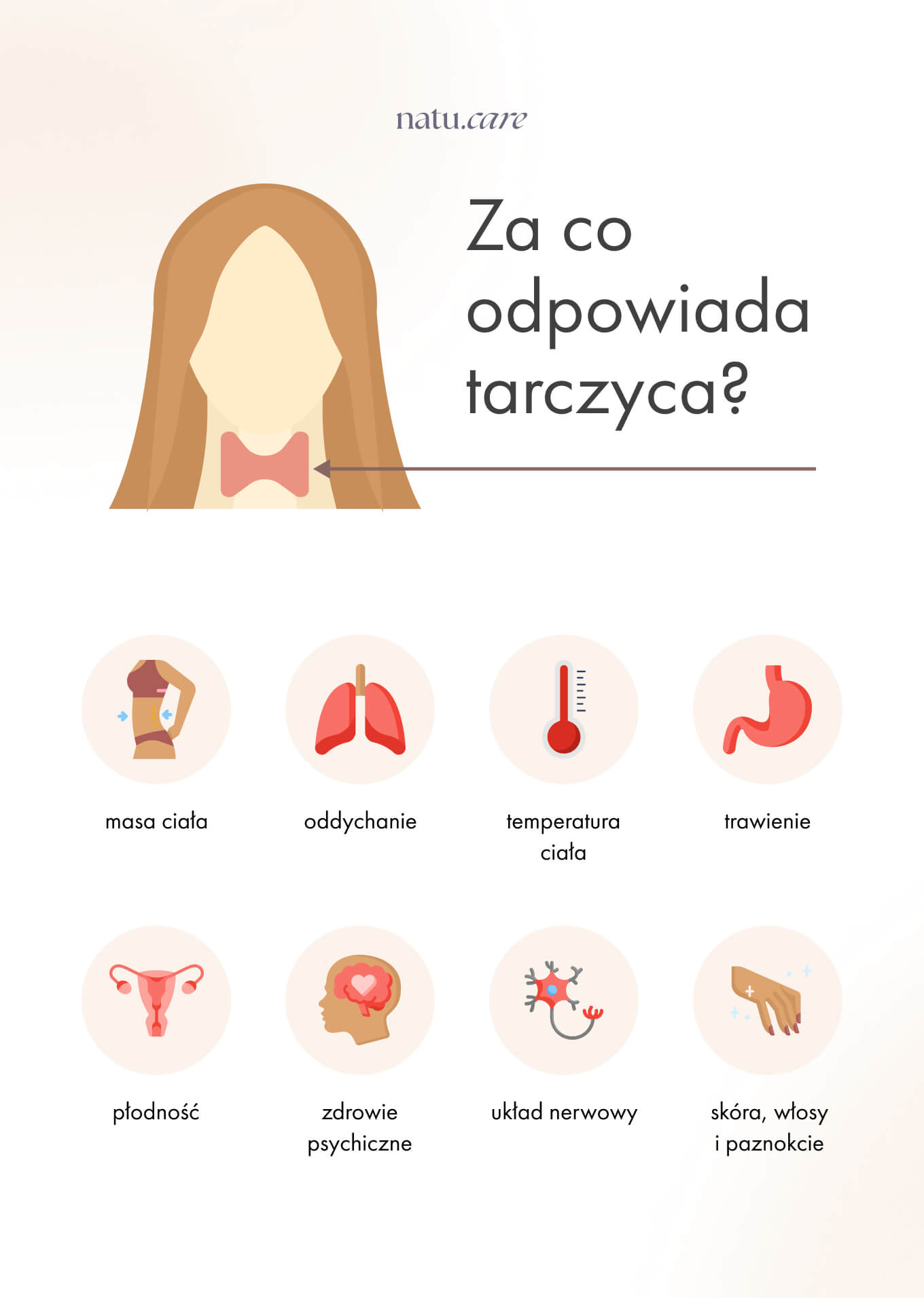
Thyroid dysfunction is difficult to diagnose unequivocally. Symptoms are usually painless, and sometimes there are so many that it is difficult to imagine that they are caused by a dysfunction of just one organ.
Both the symptoms of hypothyroidism and undothyroidism can be divided into four groupsand:
- neurological, .
- psychological, .
- changes in appearance, .
- others, .
Learn about these highlights, compare them and consider whether it is worth opting for comprehensive thyroid testing.
Symptoms that should prompt thyroid testing
.
|
Problem |
Changes in appearance |
Neurological symptoms . |
Psychiatric symptoms . |
Other |
|||||
|
Hypothyroidism . |
breakable nails overweight and obesity rash dry skin (especially on knees and elbows) . |
frequent feeling of coldness frequent feeling of coldness tingling in the limbs pain in muscles and joints |
fatigue insomnia depression apathy psychotic and paranoid problems . |
infertility irregular menstrual periods constipation weak libido low libido low blood pressure |
|||||
|
Hypothyroidism . |
swollen eyelids redness and exophthalmos of the eyes .fluffy, weak hair fatty hair problems putting on weight problems gaining weight |
sleeping problems general weakness |
.
general weakness general weakness hot flashes |
general weakness hot flashes |
anxiety irritability depression fatigue insomnia and difficulty falling asleep . |
high blood pressure irregular heartbeat (palpitations) .diarrhoea diarrhoea problems with fertility and menstruation |
problems with fertility and menstruation |
Do you notice at least some of these symptoms in yourself? That's reason enough to test your thyroid and consult your doctor!
Thyroid problems mean poor condition hair and nails. Find out how you can help them:
- Nail conditioners [Ranking] .
- Hair conditioners [Ranking] .
- Hair supplements [Ranking] .
- Nail vitamins [Ranking] .
- Hair vitamins [Ranking] .
- Hair loss supplements [Ranking] .
- Hair loss shampoos .
- Hair loss
- Hair collagen
- Biotin for hair
- Vitamin B12
- Collagen
- Zinc .
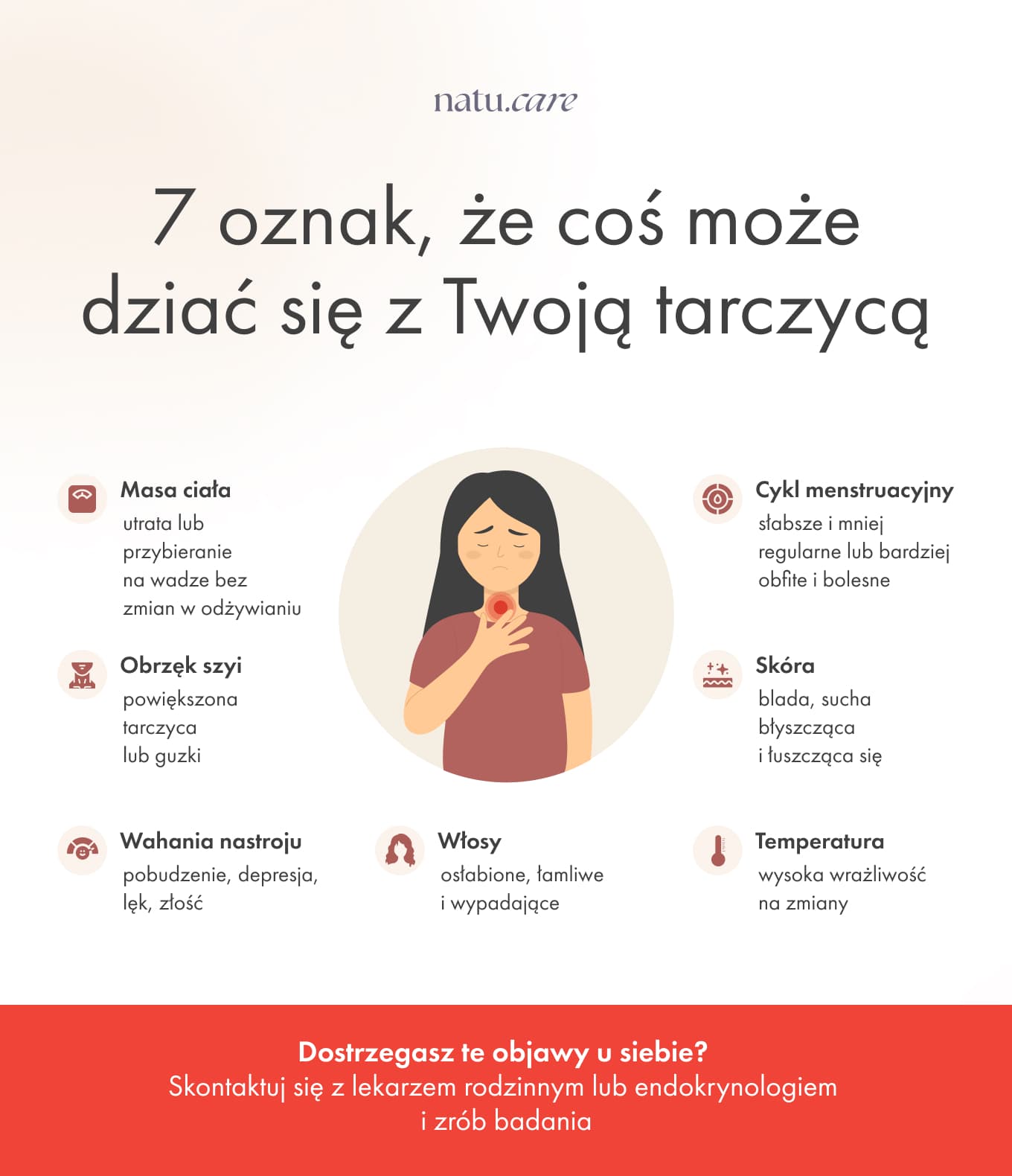
What thyroid tests can be performed?
.
The most important thyroid tests are included in so-called thyroid packages or thyroid profiles. You will find two sets of thyroid test packages on offer at diagnostic centres and laboratories - basic and extended. These are needed to detect diseases directly or indirectly related to the thyroid gland, as well as to monitor the treatment of this gland.
Basic thyroid tests
.
The TSH test
.
Although TSH (thyroid hormone, thyrotropin) is produced by the pituitary gland, it is crucial for the functioning of both the thyroid gland itself and our body. Determination of TSH levels is a fundamental test in the diagnosis of thyroid diseaseand.
Too low concentrations suggest hyperthyroidism, Graves-Basedow disease or Sheehan syndrome. Conversely, too high levels suggest hypothyroidism, Hashimoto's disease or adrenal insufficiency .
- The TSH reference values for an adult typically range from: 0.45-4.5 µU/ml. .
- The TSH concentration also depends on age or lifestyle. .
- Variations can also be caused by diet, medication taken, pregnancy or menstruation. TSH limits move upwards with age. A TSH concentration of 4.2 µU/ml may be as optimal for a 30-year-old woman as 7.8 µU/ml is for an 86-year-old.
The reference values for hormone concentrations will also vary from laboratory to laboratory, so results must always be interpreted according to the accepted ranges at a particular site.
.
 .
.
Witold Tomaszewskidoctor of medical sciences
..
Testing fT3 and fT4
.
Under the influence of TSH, the thyroid gland produces, among other things, the hormones T3 (triiodothyronine) and T4 (thyroxine), which are responsible for many processes in the body, including the use of energy, maintenance of temperature and body weight. They also support muscle strength and nervous system function. Determination of fT3 and fT4 is important in the diagnosis of thyroid disease, and the results should always be interpreted in combination with TSH levelsand.
- If the TSH concentration is elevated, the fT4 concentration will be in the lower limits or below reference values - this suggests hypothyroidism . .
- If TSH levels are reduced, fT4 will be at or above the upper limits of accepted reference values - this in turn suggests the likelihood of hyperthyroidism .
The accepted reference ranges for fT3 and fT4 oscillate within:
.
- fT3: 4.0-7.8 pmol/l .
- fT4: 10-25 pmol/l .
A single result from these tests will not diagnose any disease, but may prompt your doctor to perform additional tests to help fully assess thyroid disorders..
 .
.
Witold Tomaszewskidoctor of medical sciences
.Extended thyroid examination
.
The extended thyroid testing package includes, in addition to the testing of the hormones mentioned above, the determination of antibody levels, which may be useful in the more accurate diagnosis of specific thyroid disorders.
Extended Thyroid Testing
Anti-TPO test
.
Determination of anti-thyroid peroxidase antibodies helps in the diagnosis of Hashimoto's disease (even when TSH and thyroid hormone results are normal), autoimmune thyroid disease or Graves-Basedow disease, among othersand.
.
Anti-TG testing
.
Determination of antibodies to thyroglobulin (a protein produced by the thyroid gland) can identify autoimmune diseases, as well as monitor patients undergoing treatment for thyroid cancer .
Trab test
.
Antibodies to the TSH receptor are characteristic of Graves-Basedow disease .
Diagnosis and complementary tests
.
Thyroid disorders can be associated with or become the cause of many other ailments and conditions, such as neurological, cardiovascular and skeletal systems. If you have confirmed thyroid abnormalities, check other parameters and indicators.
Morphology - blood tests
.
Both hyperthyroidism and hypothyroidism can be responsible for the development of dangerous conditions. Hypothyroidism can contribute to anaemia, while hyperthyroidism caused by Graves-Basedow disease can lead to anaemiaand.
Regular morphology will control, among other things, the number of red blood cells and the general state of your body, so it is worth doing it at least once a year..
 .
.
Witold Tomaszewskidoctor of medical sciences
.Thyroid USG
.
It will help to accurately identify and assess the location, structure and size of the thyroid gland and detect nodules or goitre with greater accuracy. It will also be useful in monitoring the progress of therapy and treatment of thyroid diseaseand.
Lipid profile
.
People with hypothyroidism are at risk of atherosclerosis and myocardial infarction caused by excessive cholesterol build-up in the body . Checking will help you manage your diet appropriately to prevent this from happening.
Determination of homocysteine levels
.
Homocysteine is an amino acid that allows damaged tissues to regenerate. Elevated homocysteine concentrations can accompany hypothyroidism. In the long term, it can cause thrombotic problems, atherosclerotic lesions and increase the risk of heart attackand.
.
Determination of iron concentration
.
In hypothyroidism, the metabolism of iron and ferritin (i.e. its stores and transport) is impaired. Iron deficiency can lead to abnormal functioning of the thyroid gland, including a decrease in thyroid hormones.
Remember!
In addition to the aforementioned compounds and minerals, with thyroid disease, additional attention should be paid to the concentration of selenium, zinc, vitamin D, omega-3 fatty acids or vitamin B12, thiamin, vitamin C and E.
If you want to live a healthy and happy life, preventive screenings are a must. You can instantly order them without leaving your home, and consult the results with your doctor in charge. Get tested now!
Thyroid disease is often accompanied by skin problems. See how you can support it:
- Anti-Wrinkle Cream [Ranking] .
- Facial sunscreen [Ranking] .
- Eye cream [Ranking] .
- Hand Cream [Ranking] .
- BBBCreams [Ranking] .
- Collagen for wrinkles .
- Facial collagen
- Vitamin A ointment
- CeraVe creams .
- Nuxe oils
Natu.Care Collagen Premium 5000 mg, mango & passion fruit

- Collagen content: 5000 mg marine collagen hydrolysate
- Additional active ingredients: vitamin C, low molecular weight hyaluronic acid (and L-theanine and coenzyme Q10 in cocoa flavoured collagen or vitamin A and vitamin E in mango–passion fruit flavoured collagen)
- Form: powder sachets
- Dose: 1 sachet per day
- Sufficient for: 30 days
Product description
Fish collagen from the Natu.Care brand in a dose of 5000 mg, based on certified ingredients of the best quality. Regular supplementation will positively influence the appearance of the skinóry, hairów and nails – they will be rebuilt and strengthened from the inside.
In addition to collagen, which is valuable for health and beauty, it also offers other active ingredients that help to maintain a youthful complexion, shiny hair and strong nails.
The formula contains a sufficient portion of the active ingredient to positively affect joints, the musculoskeletal system and immunity.
Natu.Care Premium Collagen is available in two flavours – Cacao Bloom and Rise&Shine. Both formulas are based on the following active ingredients: marine collagen hydrolysate, wild roseóbud extract and hyaluronic acid.
Additionally, Cacao Bloom contains natural L-theanine, coenzyme Q10 and defatted Dutch cacao. Rise&Shine instead contains vitamin E and vitamin A.
These are the best collagens in the world.
These best fish collagens on the market also rós taste – Cacao Bloom is a treat for chocolate lovers. Rise&Shine will appeal to those whoólike the refreshing taste of mangoófruit and passion fruit.
Pros and cons
Pros:
- Vitamin C supports the body's collagen production, enhancing its effectiveness.
- An effective dose of hyaluronic acid, which additionally supports skin hydration and joint health.
- Fish collagen absorbs 50% better. Additionally, the manufacturer specifies the fish species it is sourced from (Atlantic cod).
- The composition has been tested by the independent and accredited J.S. Hamilton laboratory.
- MSC (Marine Stewardship Council) quality certification, which confirms that the collagen source supports sustainable fishing practices.
Cons:
- None.
Additional information
Natu.Care's fish collagen receives praise for its delicious taste. You won't find the fishy aftertaste that often comes through in other collagens. Plus, you have two tasty flavors to choose from: cocoa and mango-passionfruit.
Active ingredients like coenzyme Q10, hyaluronic acid, and natural L-theanine provide anti-inflammatory and antioxidant benefits while slowing down aging processes.
User review
Super, after about 6 weeks of use, the skin on my face became noticeably firmer. Wonderful taste.
Ania ZalewskaNatu.Care customer
Natu.Care Premium collagen 10 000 mg, mango-maracuja

- Collagen content: 10,000 mg marine collagen hydrolysate
- Additional active ingredients: vitamin C, low molecular weight hyaluronic acid (and L-theanine and coenzyme Q10 in cocoa flavoured collagen or vitamin A and vitamin E in mango–passion fruit flavoured collagen)
- Form: powder sachets
- Dose: 1 sachet per day
- Sufficient for: 30 days
Product description
One of the strongest collagens on the market, whichós provides as much as 10,000 mg in a daily serving. This allows the formula to effectively support the condition of the skin, hair and nails.
With this supplement, you will support your beauty, which will allow you to visually stop the ageing process and feel a second youth!
Natu.Care Collagen Premium 10 000 mg comes in two flavours – cherry and mango-maracuja. Both formulas have the same product backbone – collagen, hyaluronic acid and vitamin C.
In the cherry version you additionally find glucosamine, chondroitin and Indian frankincense resin extract. Mango-maracuja, on the other hand, contains vitamin E and vitamin A.
Pros and cons
Pros:
- Tested collagen formula – SeaGarden, whose effects have been confirmed in clinical studies.
- Effective dose of hyaluronic acid, additionally moisturizing the skin and positively impacting joint health.
- Vitamin C supports the body’s natural collagen production.
- The composition has been tested by the independent and accredited J.S. Hamilton laboratory.
- The product has an MSC (Marine Stewardship Council) quality certification – the collagen source supports sustainable fishing practices.
Cons:
- None.
Additional information
Users praise Natu.Care Collagen Premium for the easy dissolvability of the powder.
User review
I noticed a significant improvement in my skin texture after a few weeks of taking collagen regularly. My complexion is now as soft as velvet!
Natu.Care Collagen Premium 10000 mg, cherry

- Collagen content: 10,000 mg of hydrolyzed bovine collagen
- Additional active ingredients: vitamin C, low molecular weight hyaluronic acid, glucosamine, chondroitin, extract of Indian frankincense resin (boswellia serrata)
- Form: powder sachets for drinking
- Serving: 1 sachet per day
- Lasts for: 30 days
Product description
One of the strongest collagens on the market, providing as much as 10,000 mg per daily serving. This product can effectively support the condition of joints, skin, hair, and nails.
With this supplement, you will support your skeletal and joint system as well as your beauty, helping you visually halt the aging process and feel rejuvenated!
Pros and cons
Pros:
- The daily portion of collagen is very large – as much as 10,000 mg.
- Proven collagen formula – COLLinstant, whose effectiveness has been confirmed in clinical studies.
- Effective dose of hyaluronic acid, which additionally moisturizes the skin and positively affects joint health.
- Vitamin C supports the body's natural collagen production.
- Glucosamine is a fundamental building block of compounds found in joint cartilage and a component of collagen that gives elasticity to connective tissue in tendons.
- Chondroitin is a natural component found in the human body, mainly in cartilage. This large molecule (mucopolysaccharide) has the ability to absorb water, which helps maintain the elasticity and resilience of cartilage.
- Frankincense resin extract supports blood circulation and joint mobility and reduces their stiffness. It may help alleviate inflammatory conditions.
- The composition has been tested by the independent and accredited J.S. Hamilton laboratory.
Cons:
- None.
Additional information
Users praise Natu.Care Collagen Premium for the easy dissolving of the powder.
Premium Sodium Butyrate
Product description
Premium Sodium Butyrate is a natural support for your digestive system. With a high dose of butyric acid (940 mg), it supports the regeneration of the intestinal mucosa, improving gut health and function, and aids in the absorption of nutrients. By taking care of your intestines, you're taking care of the health of your entire body.
Studies involving people suffering from irritable bowel syndrome confirm that sodium butyrate is ideal for supporting issues related to bacterial flora imbalances (for example, after antibiotic therapy), constipation and diarrhea, inflammation of the intestinal mucosa, or a diet low in fiber.
Premium Sodium Butyrate capsules are made using the innovative DRcaps® technology. This guarantees that the active ingredients in the product are protected from the destructive effects of stomach acids and digestive enzymes. As a result, we can be sure that the beneficial ingredients are released in the small intestine and are fully absorbed by our body.
Premium Sodium Butyrate from Natu Care is 100% tested, and its composition contains only the highest quality raw materials.
Pros and cons
Pros:
- Supports digestive system function
- Helpful for various gastrointestinal conditions, including IBS
- High dose of butyric acid in each capsule
- Eco-friendly, clean, and tested composition
- Free from added sugar, gluten, GMOs, and lactose
- Innovative capsule technology - DRcaps
Cons:
- None
Additional Information
Take 3 capsules daily at any time of the day, preferably with a meal. Swallow the capsules whole with water.
Premium Sodium Butyrate is intended for adults.
The product should be used under medical supervision.
User review
I've been using the product for 2 weeks. My stomach feels lighter, and my digestion has improved. I recommend it.
Natu.Care Premium Magnesium + Vitamin B6

- Magnesium content per day: 305 mg
- Additional active ingredients: Vitamin B6 (2.1 mg)
- Form: capsules
- Serving size: 3 capsules per day
- Sufficient for: 30 days
Product description
The Premium Magnesium + Vitamin B6 dietary supplement is a comprehensive product that combines three organic forms of magnesium (citrate, malate, and diglycinate) and vitamin B6 in highly absorbable forms.
Magnesium is an essential mineral without which our bodies cannot function properly. It supports the immune, nervous, and muscular systems, maintains electrolyte balance, and is involved in cell division and the regulation of mental functions.
Research shows that magnesium supplementation is even more effective when accompanied by vitamin B6, which is included in our product. Vitamin B6 is responsible for the proper functioning of the nervous and immune systems, as well as the proper functioning of the heart.
If you want to safely get rid of feelings of fatigue, concentration problems, hair loss, muscle cramps, trembling, or irritability, reach for Premium Magnesium from Natu.Care, tested by the independent, certified laboratory J.S. Hamilton Poland.
Pros and cons
Pros
- Supports the proper functioning of the nervous and immune systems.
- Reduces feelings of fatigue and tiredness.
- Maintains proper psychological functions.
- The purity of the ingredients (free from anti-caking agents, artificial fillers, and additives such as titanium dioxide, microcrystalline cellulose, talc, magnesium stearate, and silicon dioxide) has been confirmed by laboratory tests.
- High absorption of ingredients.
- Soft capsules that are easy to swallow.
- Suitable for vegetarians and vegans.
Cons
- None.
Additional information
Take with a meal, 3 capsules per day.
The capsules should be taken with at least 250 ml of water.
If you have trouble sleeping, it is advisable to take 1 capsule in the morning and 2 capsules in the evening, no later than 4 hours before bedtime.
Avoid combining with products high in calcium (milk, yogurt, cheese), as this may negatively affect magnesium absorption.
Pregnant and breastfeeding women should consult a doctor before starting supplementation.
User review
I’m very impressed with the speed of delivery. The product itself is of high quality and absorbs well. After two weeks of supplementation, I’ve noticed a significant improvement in muscle recovery, especially during periods of intense training. I highly recommend it!
Product description
The dietary supplement contains omega-3ᵀᴳ, or omega-3 acids in the form of trójglyceridesów. Scientific studies suggest that this form of fatty acidsós up to 2 times better absorbed than the estersós present in many dietary supplements on the market. This means that you are assured of their effectiveness and of supplying yourself with valuable omega acids.
Fatty acids omega-3 are derived from wild anchovy oil. It is a rich source of healthy fats that are essential for the health of the cardiovascular, immune and nervous systems, as well as the proper function of vision, joints muscles.
Scientific research suggests that wild anchovies are a good source of healthy fats.
Scientific research also suggests that an adequate intake of omega-3 fatty acidsós protects against and supports the treatment of depression and anxiety disorders. In addition, omega-3s influence the hydration and appearance of the skinóry and support healthy sleep.
.
The formula contains a total of 750 mg of EPA+DHA acidsós, which is three times higher than the recommended minimum of 250 mg for the Polish population. Omega-3 TG Premium has studies indicating that its TOTOX is 9, which is a very good result.
Supplementation of omega-3 fatty acidsóis recommended for anyone who does not eat 1–2 portions (approximately 300 g) of oily fish per week. Children during growth, seniors, physically active people, vegans and vegetarians, as well as patients undergoing cardiovascular treatment and prevention of heart disease also have an increased need.
Pros and cons
The dietary supplement contains omega-3ᵀᴳ, or omega-3 acids in the form of trójglyceridesów. Scientific studies suggest that this form of fatty acidsós up to 2 times better absorbed than the estersós present in many dietary supplements on the market. This means that you are assured of their effectiveness and of supplying yourself with valuable omega acids.
Fatty acids omega-3 are derived from wild anchovy oil. It is a rich source of healthy fats that are essential for the health of the cardiovascular, immune and nervous systems, as well as the proper function of vision, joints muscles.
Scientific research suggests that wild anchovies are a good source of healthy fats.
Scientific research also suggests that an adequate intake of omega-3 fatty acidsós protects against and supports the treatment of depression and anxiety disorders. In addition, omega-3s influence the hydration and appearance of the skinóry and support healthy sleep.
.
The formula contains a total of 750 mg of EPA+DHA acidsós, which is three times higher than the recommended minimum of 250 mg for the Polish population. Omega-3 TG Premium has studies indicating that its TOTOX is 9, which is a very good result.
Supplementation of omega-3 fatty acidsóis recommended for anyone who does not eat 1–2 portions (approximately 300 g) of oily fish per week. Children during growth, seniors, physically active people, vegans and vegetarians, as well as patients undergoing cardiovascular treatment and prevention of heart disease also have an increased need.
Additional information
The dietary supplement contains omega-3ᵀᴳ, or omega-3 acids in the form of trójglyceridesów. Scientific studies suggest that this form of fatty acidsós up to 2 times better absorbed than the estersós present in many dietary supplements on the market. This means that you are assured of their effectiveness and of supplying yourself with valuable omega acids.
Fatty acids omega-3 are derived from wild anchovy oil. It is a rich source of healthy fats that are essential for the health of the cardiovascular, immune and nervous systems, as well as the proper function of vision, joints muscles.
Scientific research suggests that wild anchovies are a good source of healthy fats.
Scientific research also suggests that an adequate intake of omega-3 fatty acidsós protects against and supports the treatment of depression and anxiety disorders. In addition, omega-3s influence the hydration and appearance of the skinóry and support healthy sleep.
.
The formula contains a total of 750 mg of EPA+DHA acidsós, which is three times higher than the recommended minimum of 250 mg for the Polish population. Omega-3 TG Premium has studies indicating that its TOTOX is 9, which is a very good result.
Supplementation of omega-3 fatty acidsóis recommended for anyone who does not eat 1–2 portions (approximately 300 g) of oily fish per week. Children during growth, seniors, physically active people, vegans and vegetarians, as well as patients undergoing cardiovascular treatment and prevention of heart disease also have an increased need.
Expert opinion
The dietary supplement contains omega-3ᵀᴳ, or omega-3 acids in the form of trójglyceridesów. Scientific studies suggest that this form of fatty acidsós up to 2 times better absorbed than the estersós present in many dietary supplements on the market. This means that you are assured of their effectiveness and of supplying yourself with valuable omega acids.
Fatty acids omega-3 are derived from wild anchovy oil. It is a rich source of healthy fats that are essential for the health of the cardiovascular, immune and nervous systems, as well as the proper function of vision, joints muscles.
Scientific research suggests that wild anchovies are a good source of healthy fats.
Scientific research also suggests that an adequate intake of omega-3 fatty acidsós protects against and supports the treatment of depression and anxiety disorders. In addition, omega-3s influence the hydration and appearance of the skinóry and support healthy sleep.
.
The formula contains a total of 750 mg of EPA+DHA acidsós, which is three times higher than the recommended minimum of 250 mg for the Polish population. Omega-3 TG Premium has studies indicating that its TOTOX is 9, which is a very good result.
Supplementation of omega-3 fatty acidsóis recommended for anyone who does not eat 1–2 portions (approximately 300 g) of oily fish per week. Children during growth, seniors, physically active people, vegans and vegetarians, as well as patients undergoing cardiovascular treatment and prevention of heart disease also have an increased need.
Natu.Care Vitamin D 2000 UI
Product description
Vitamin D plays a crucial role in our health and well-being. It affects calcium and phosphate metabolism, which translates to healthy bones and teeth. It also helps regulate the immune system, and studies indicate its influence on the functioning of the nervous system.
Vitamin D, although called a “vitamin,” is actually a prohormone that our body produces on its own, primarily under the influence of sunlight. Unfortunately, our modern lifestyle contributes to deficiencies of this essential vitamin. Working in enclosed office buildings, using (necessary!) SPF creams, and covering the body with clothing all make it very difficult, if not impossible, to obtain adequate levels of vitamin D from sunlight. This is why appropriate, year-round supplementation is so crucial.
Vitamin D from Natu.Care is a well-tested vitamin D3 suspended in safflower oil, a plant known for its numerous health benefits. The convenient, easy-to-swallow capsule will make supplementation a part of your daily, healthy routine, improving your overall well-being.
Pros and cons
Pros:
- Ensures proper functioning of the immune system
- Supports the maintenance of healthy bones and teeth
- Maintains proper heart, kidney, and muscle function
- Tested by an independent, certified laboratory
- Convenient and easy-to-swallow capsule
- Clean composition - free from added sugar, gluten, GMOs, lactose, and without preservatives or colorants
Cons:
- None.
Additional Information
Pregnant women and breastfeeding mothers should consult a doctor before using the product. This dietary supplement is intended for a healthy adult population up to the age of 75.
Collagen Booster - Glow Stories

- Active ingredients: bamboo shoot extract, Quatrefolic®, L-Methionine, L-cysteine, vitamin E, vitamin A, niacin (vitamin B3), vitamin B6, vitamin B2 (riboflavin), biotin, zinc, copper
- .
- Form: capsules
- .
- Dose: 1 capsule per day
- .
- Sufficient for: 60 days
- .
Product description
A dietary supplement containing vitamins, minerals and plant extracts thatósupport the skinóhand, hair and nails. The product is especially distinguished by the form of folate – it is Quatrefolic, whichós absorbed very well and is natural.
In addition to valuable vitamins and minerals, such as vitamin A, E, B3, B2 and biotin, the formula contains bamboo shoot extract, whichóry further enhances your beauty.
Pros and cons
A dietary supplement containing vitamins, minerals and plant extracts thatósupport the skinóhand, hair and nails. The product is especially distinguished by the form of folate – it is Quatrefolic, whichós absorbed very well and is natural.
In addition to valuable vitamins and minerals, such as vitamin A, E, B3, B2 and biotin, the formula contains bamboo shoot extract, whichóry further enhances your beauty.
Additional information
A dietary supplement containing vitamins, minerals and plant extracts thatósupport the skinóhand, hair and nails. The product is especially distinguished by the form of folate – it is Quatrefolic, whichós absorbed very well and is natural.
In addition to valuable vitamins and minerals, such as vitamin A, E, B3, B2 and biotin, the formula contains bamboo shoot extract, whichóry further enhances your beauty.
How often to do thyroid tests?
.
The thyroid gland regulates the function of virtually the entire body, so you need to take care of it. Remember - prevention is the most important thing, and prevention is better than cure. If someone from your immediate family has a thyroid disease - it is also worth getting yourself examined, especially if the symptoms may suggest some dysfunction of this gland.
Thyroidism is a disease of the thyroid gland.
Basic and dilated thyroid examinations are worth doing at least once a year, and thyroid ultrasound at least once every two years. Especially if you have a history of thyroid disease in your immediate family..
 .
.
Witold Tomaszewskidoctor of medical sciences
..
Of course, how often to do thyroid tests depends on your condition.
For thyroid-related diseases, testing of TSH, fT3 and fT4 levels is usually done every three months, and every six weeks when changing treatment to check the effectiveness of the therapy. In Hashimoto's disease, on the other hand, a check of the anti-TPO and anti-TG levels once every one or two years is sufficient.
The final decision will always rest with the treating physician.
.
Why is it important to have thyroid tests done?
.
Blood tests for the diagnosis of thyroid disease will helpand:
.
- .
- prophylactically assess thyroid function, .
- determine whether distressing symptoms have an endocrine basis, .
- in case of "bad" results, make an earlier diagnosis and initiate effective treatment, .
- diagnose or confirm dangerous thyroid diseases such as hypothyroidism, hyperthyroidism or Hashimoto's or Graves-Basedow's disease, .
- save the time you spend in queues and the doctor's surgery, .
- with the choice of testing packages, save money too. .
.
Where to get your thyroid tested?
.
All thyroid tests can be done privately, as well as on the National Health Service.
.
Thyroid tests on the National Health Service
.
You can have all thyroid tests done free of charge as part of your National Health Service reimbursement - however, a referral from your GP (in which case you will be able to have basic tests) or an endocrinologist (full package) is required.
Private Thyroid Tests
Private Thyroid Tests
Private thyroid tests
.
If you are pressed for time and don't want to wait for a referral, you can benefit from paid private thyroid tests.
How much do thyroid tests cost
.
The price depends primarily on the number of parameters you want to determine and the complexity of the tests you choose. You can order individual tests, but it is definitely more cost-effective to use packages. Diagnostic centres and laboratories usually offer two packages - basic and extended.
.
How thyroid tests are done - preparation and results
.
Blood tests to assess thyroid function are non-invasive and require no special preparation. All you need to do is take a blood sample and submit it for laboratory analysis.
What conditions must be met for the results of thyroid tests to be reliable?
.
- .
- Do the tests in the morning or, in the case of repeated tests, at a specific time: TSH shows a variation in secretion throughout the 24-hour period. .
- You do not need to be fasting. .
- Women can do thyroid tests on any day of the cycle: it does not affect the results. .
- Do not come to the test after a lot of physical exertion and stress: these can falsify the results. .
- Blood tests are best carried out in good health: infection and a cold should not affect the results. .
- If it is a control test, do not do the test after taking thyroid medication. Taking substances such as glucocorticosteroids, dopamine or biotin may also affect the results.
How long to wait for thyroid test results?
.
You will usually receive the results of individual tests or the whole package on the same or next working day - it all depends on the workload of the specific laboratory.
How to test and check your thyroid gland yourself (and if it's even possible)?
.
Detailed examinations of the thyroid gland, combined with additional tests, will allow you to accurately determine its state and condition. In between, you can monitor its condition yourself without leaving your home. A simple self-examination can help detect nodules or changes that may indicate thyroid disease.
To perform a thyroid self-examination, all you need is a mirror and a glass of water.
How to perform a thyroid self-examination?
.
- Stand in front of a mirror so that you can see the front of your neck in its entirety. .
- Tilt your head back slightly.
- Tilt your head back slightly.
- Stretch your neck upwards. .
- Take a sip of water. .
- Carefully observe in a mirror the moment of swallowing, without lowering your head. .
Moving your oesophagus will make it easier to spot asymmetrical changes and nodules - if you are unsure, repeat the observation.
You can also perform a so-called palpation examination of the thyroid gland. This involves tactile assessment and feeling for the presence of any nodules.
Palpation thyroid examination can help in the early diagnosis of cancer - by palpation we are able to detect nodules. It is worth performing as part of regular prevention. It should especially be done by women over 40, who can combine it with a regular thyroid ultrasound..
 .
.
Witold Tomaszewskidoctor of medical sciences
.One of the symptoms of thyroid disease is mood swings, sleep problems and even depression. This is why mental balance and healthy sleep are so important. Read how you can take care of these:
- Sleep hygiene .
- Prescription-free sleep pills
- Melatonin for sleep .
- Melatonin
- Sedation tablets without prescription
- Sedation tablets
- Ashwagandha
- CBD oil
- Passionflower
Hopefully you now know why prevention is so important and you won't be looking for excuses not to get your thyroid tested. If you still have questions or concerns, feel free to drop by the comments section.
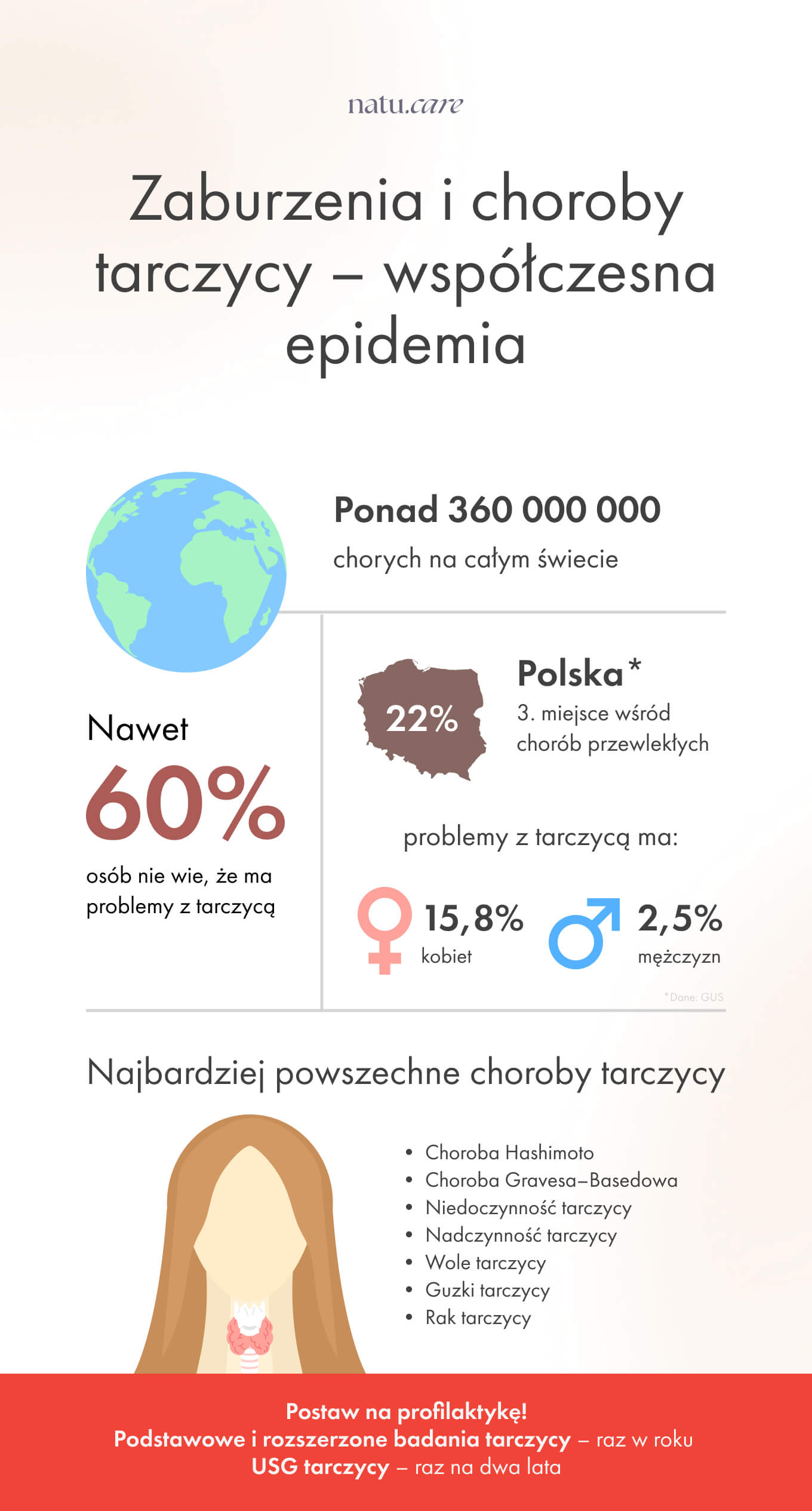
See also:
Summary
.
Proper thyroid function is one of the keys to your health and well-being.
From this text, remember that:
- The thyroid gland is a small gland that regulates many processes in our body - from metabolism and energy expenditure to cardiac function and mental wellbeing.
- The thyroid gland is a small gland that regulates many processes in our body - from metabolism and energy expenditure to cardiac function and mental wellbeing.
- Symptoms of thyroid disorders and diseases can be easily overlooked and attributed to other conditions.
- Preventive thyroid blood tests should be done at least once a year and thyroid ultrasound once every two years - unless otherwise advised by your doctor. .
- Basic diagnostic tests include determination of TSH levels, as well as fT3 and fT4. .
- The extended thyroid package also includes anti-TPO, anti-TG and TRAb tests. .
- At home, you can perform a thyroid self-examination, as well as a so-called palpation test, which can help to detect nodules or asymmetrical lesions early.
- There are also a number of tests you can perform at home.
- You can perform the tests privately or free of charge on the National Health Service, but you will need a doctor's referral for this.
- The most common thyroid problems are hypothyroidism or hyperthyroidism, Hashimoto's disease, Graves-Basedow's disease, goiter and thyroid cancer.
- The most common thyroid problems are hypothyroidism or hyperthyroidism, Hashimoto's disease, Graves-Basedow's disease, goiter and thyroid cancer.
FAQ
.What tests are performed on the thyroid gland?
.Basic thyroid tests include an indication of TSH, fT3 and fT. Enhanced tests (the so-called thyroid package) also include anti-TPO, anti-TG and TSH receptor antibody (TRAb) determination. In the diagnosis of thyroid disease, it is also worthwhile to carry out blood morphology, thyroid ultrasound, lipidogram, and determination of iron and homocysteine.
What TSH result is of concern?
.The determination of TSH levels is fundamental to the diagnosis of thyroid disease. Reference values for adults are in the range of 0.45-4.5 µU/ml.
Results below the range suggest hyperthyroidism and Graves-Basedow disease. Concentrations that are too high - hypothyroidism or Hashimoto's disease.
Ranges in the concentration range suggest hypothyroidism and Hashimoto's disease.
The TSH concentration range shifts with age, and fluctuations are caused by diet, lifestyle, medications taken, pregnancy or menstruation.
How much do thyroid tests cost?
.Prices depend on the specific laboratory, as well as the package you choose. You can choose to have single factor testing, a basic package or an extended package. The most cost-effective tests are those in the extended package - they include all the major thyroid tests. Their prices start at around PLN 150.
.Are thyroid tests reimbursable?
.Thyroid tests can be done privately - in which case they will be charged. A referral for a thyroid hormone test can be made by your GP or an endocrinologist specialist - in which case the tests will be done for free. Unfortunately, an extended package of tests is rarely prescribed straight away at your GP's surgery.
If you suspect you have a thyroid problem, ask your doctor for a referral or have the tests done privately and consult a specialist for the results.
Hashimoto's disease is hyperthyroidism or hypothyroidism?
.Hashimoto's disease is a condition of chronic inflammation of the thyroid gland and is one of the main causes of hypothyroidism. It is an autoimmune disease in which the immune system gradually destroys thyroid cells. Importantly, it often does not produce the symptoms typical of hypothyroidism. The basis for further diagnosis may be an excessively high TSH level in the blood, which is why regular check-ups are so important.
How to detect hypothyroidism?
.Basic tests in the diagnosis of hypothyroidism are determinations of the concentrations of its hormones. This begins with a TSH test - elevated concentrations suggest inefficient function of this gland. To confirm, diagnostic tests are usually ordered, i.e. fT3 and fT4. An ultrasound of the thyroid gland will also be helpful. In the process of diagnosing Hashimoto's disease, anti-TPO and anti-TG tests are additionally performed.
Do you need to be fasting for thyroid testing?"
.The TSH test does not require much preparation - you do not need to be fasting. It is important to have your blood drawn in the morning or at a specific time for repeat testing. This is all because TSH has a pulsatile secretion pattern throughout the day - the highest concentrations are observed late in the evening and the lowest in the midday hours.
Can a diseased thyroid be cured?
.Hypothyroidism requires treatment with levothyroxine preparations and regular TSH monitoring - unfortunately, very often for life. However, there are cases of spontaneous remission and resolution of the disease.
The complete cure of hyperthyroidism depends primarily on its cause. After surgical treatment or therapy with radioactive iodine, hypothyroidism may develop, requiring thyroxine and medical follow-up for the rest of the patient's life.
The following is a summary of the cases of hypothyroidism.
What is TSH in a blood test?
.TSH is a hormone produced by the pituitary gland that stimulates the thyroid gland to secrete the hormones T3 and T4. TSH concentration in the blood is determined when a thyroid disorder is suspected and during hormone treatment with thyroxine preparations.
Too low concentrations may suggest hyperthyroidism and too high concentrations may suggest hypothyroidism.
When to test TSH in an infant?
.The risk of fetal and neonatal thyroid disorders is negligible. Nonetheless, it is worthwhile to determine TSH levels as a standard screening test.
All newborns at risk should have their TSH and fT4 levels measured in cord blood or venous blood - sometimes the test will need to be repeated several times.
Important observation within two weeks after birth. If signs of hypothyroidism are present, TSH and fT4 levels should be measured within 7-10 days of life.
The following is an important step.
.
Resources
.See all
.Catargi, B., Parrot-Roulaud, F., Cochet, C., Ducassou, D., Roger, P., & Tabarin, A. (1999). Homocysteine, hypothyroidism, and effect of thyroid hormone replacement. Thyroid: Official Journal of the American Thyroid Association, 9(12), 1163-1166. https://doi.org/10.1089/thy.1999.9.1163
Chatterjee, S., Chakrabarti, P., & Sinhamahapatra, P. (2021). Relationship between iron metabolism and thyroid hormone profile in hypothyroidism. International Journal of Research in Medical Sciences, 9(3), 790-793. https://doi.org/10.18203/2320-6012.ijrms20210879
Fischli, S., von Wyl, V., Trummler, M., Konrad, D., Wueest, S., Ruefer, A., Heering, K., Streuli, R., Steuer, C., Bernasconi, L., Recher, M., & Henzen, C. (2017). Iron metabolism in patients with Graves' hyperthyroidism. Clinical Endocrinology, 87(5), 609-616. https://doi.org/10.1111/cen.13450
Rugge, J. B., Bougatsos, C., & Chou, R. (2014). Introduction. In Screening for and Treatment of Thyroid Dysfunction: An Evidence Review for the U.S. Preventive Services Task Force [Internet]. Agency for Healthcare Research and Quality (US). https://www.ncbi.nlm.nih.gov/books/NBK285870/
Sheehan, M. T. (2016). Biochemical Testing of the Thyroid: TSH is the Best and, Oftentimes, Only Test Needed - A Review for Primary Care. Clinical Medicine & Research, 14(2), 83-92. https://doi.org/10.3121/cmr.2016.1309
Triiodothyronine (T3) Tests: MedlinePlus Medical Test. (n.d.). Retrieved March 16, 2023, from https://medlineplus.gov/lab-tests/triiodothyronine-t3-tests/
Wang, F., Tan, Y., Wang, C., Zhang, X., Zhao, Y., Song, X., Zhang, B., Guan, Q., Xu, J., Zhang, J., Zhang, D., Lin, H., Yu, C., & Zhao, J. (2012). Thyroid-stimulating hormone levels within the reference range are associated with serum lipid profiles independent of thyroid hormones. The Journal of Clinical Endocrinology and Metabolism, 97(8), 2724-2731. https://doi.org/10.1210/jc.2012-1133
.
Editorials
Meet the team

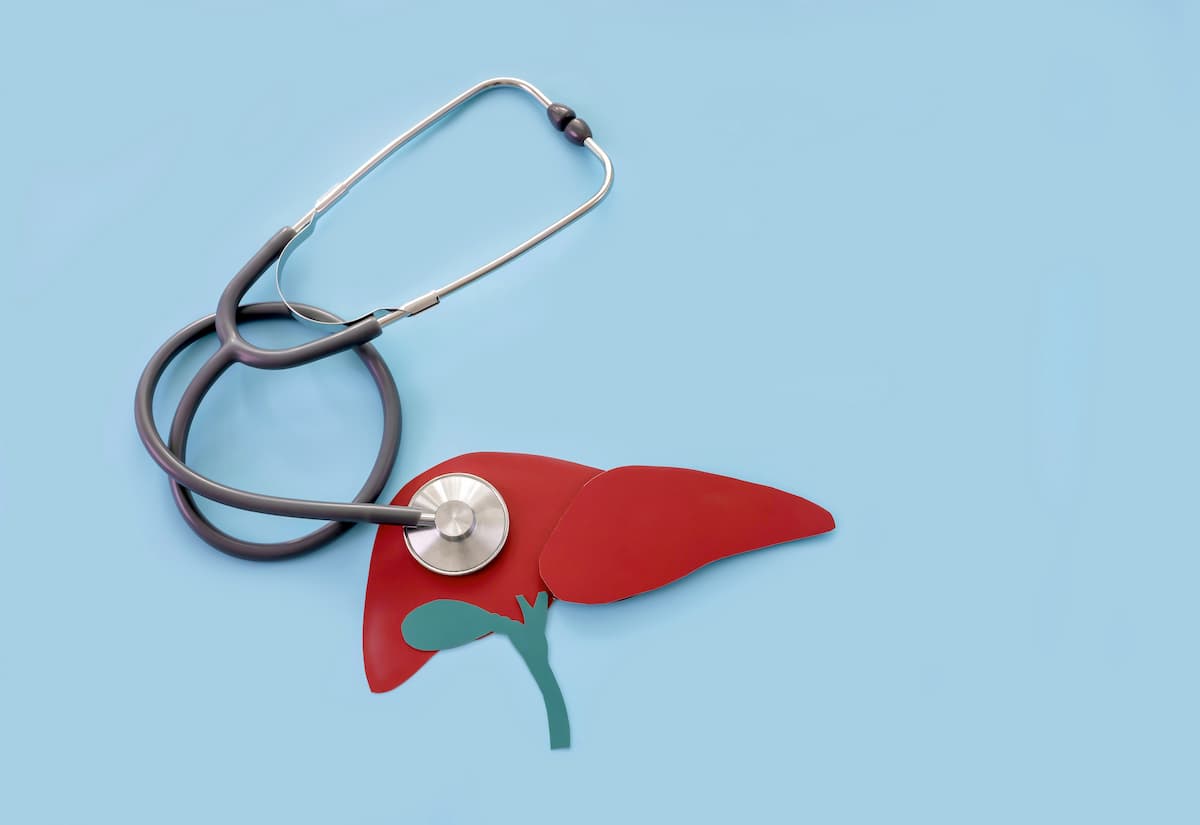
Liver tests are a test to assess the function of this organ. Find out when to perform them.

What cortisol testing is, why it is important and what symptoms should prompt you to do it.
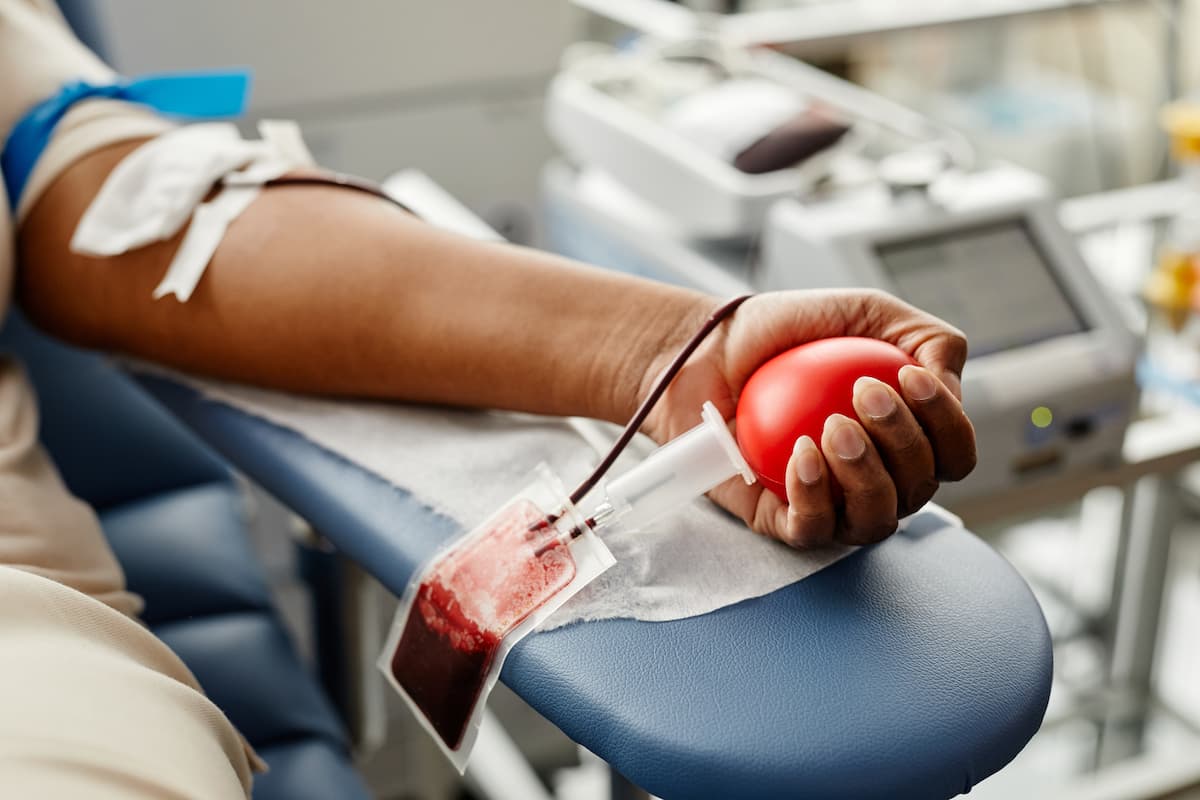
Blood tests can detect many conditions, monitor treatment and also assess the patient's general condition.



